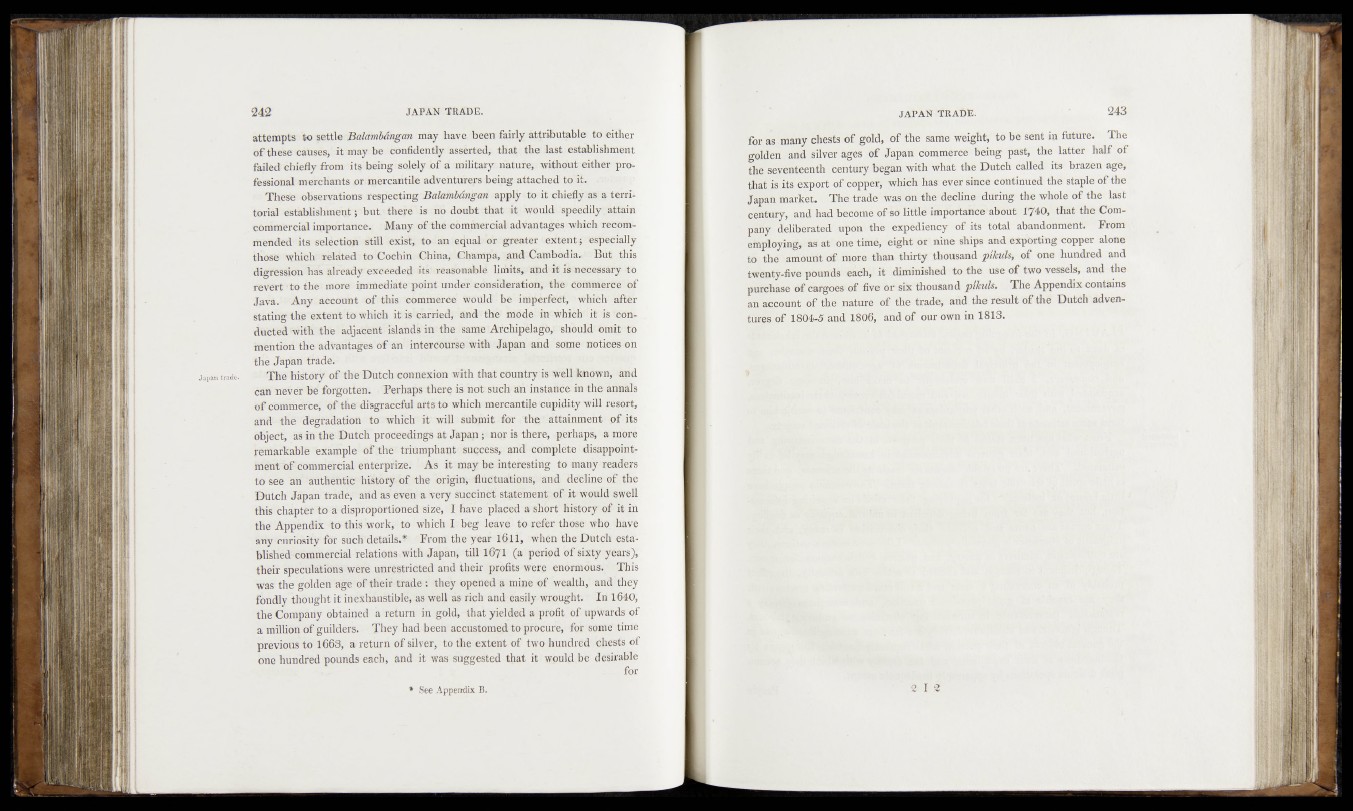
Japan tra
attempts to settle Balaiabangan may have.been fairly attributable to either
of these causes, it may be confidently asserted, that thé last establishment
failed chiefly icsnt' its I being solely o f a military nature-,, .Without either rpro-
ifessiond merchants orópmrcahtile adventurers.being attached to il. -
These observations respecting Balambtingm apply - torit chiefly as. a territorial
estWMisb'meintybiit,' there is ho doubt that it.-would speedily'/attain
commercial importance. Many of the commercial advantages which, recommended
its .selection stiU exist, to an e4ual o r' greater f extent^specially
those which - xehkedrtoi Cochin Ghhra, Gh&mp'a, and Cambodxa^^' Biit Jhig
digression haTs 'already exceeded its? reasonable limits, and if ismecessary to
revért 'tö the-more immediate' point under consideration, the1 commerce of
Java.' Any account of this commerce would .be’ iinpérfeét, 'whieh after
stating the extent' to which it is carried, and- thé mode ineWhtêh-itniS *cbn-
duetéd With the adjaéettf islands infthe same 'AtcBipelagó/ ’shonld Omit 'to
mention the advantages of an intercourse With Japan and sopae notices on
tliè Japan tfadél • r
- : - Thé Mstóry of the Dutch connexion wïTth that country1« Well-known* and
cafi'névérihé forgotten. , Perhaps therp is not such an instance in the ahnhls
of commerce, of thé disgraceful arts to which mercantile cupidity wdh resort,
andMbe degradation to "which it will submit for the.' attainment, pftits
Object, as in thé Duteh proceedings at Japan* nep-is there, ^phrhaps* a more
Remarkable example • -of Jh e ' triumphant i success, and' compléte disappointment'of
commercial éhterprizé. As it may be interesting to many fielders
to sèfe dh 'authentic history of the origin* 'fluctuations, and ^lé&linév&fefhe
Butch Japan trade'/?,arid as even a very Succinct .statémenfcöï- it’ would swell
tbis chdpter to a disproportioned size,f I have'"placed a^short.hisfory^ofjit hi
the Appendix tó this'work, to which I. beg leave tb. j-e|éK'thbsé who. JfaVfe
ady curiosity for süchdétails.* From the yeaTlöJJi, -when thé'Dütch established'
commercial relations .with Japan; t i l l l671 (a period of sixty years),
theif specuTatioös wfefe unrestricted and their pEofits w’efp enórmöuSi/ This
Was the golden1 age of theif trade : 'they opened a mine of wealth,' andifhe^
fondly thought if inexhaustible* ;as well as rich and'easily-Wrought; i' :Iri 1-640,
the Company obtained a return1 in gold, that yielded aipfofit ]öf upwards of
a million of guilders. They had been accustomed to-procure, for some'time
previous to 1668* a return of silver, to the extent of two hundred chests of
one hundred pounds each, and it was suggested that it wpuld.be desirable
* See Appendix B.
for as many chests óf gold, Of-the same weight, to be sent-in future. The
golden and silver ages of Japan commerce being past, the latter half of
the seventeenth Century began with1 what the Dutch called its brazen age,
that' -is its export of copper; y(®ich has ever since continued the staple of the
Japan market. The trade was on1 the decline - during the whole of the last
century, andlhad become of AO little importance’about 1740, that the Company
deliberated" .upon' the expÓdiëncy. i'bf its total abandonment*1 From
employing, as at one time, eight or nine ships and exporting copper alone
to the amount df more than thirty thousand pikuls, ©f one hundred and
twenty-five pounds each, it diminished to the use of two vessels, and the
purchase, of cargoes of five or six thousand pikuls. Thé Appendix contains
an account of the nature of the trade, and the result of thé Dutch adventures
of 1804-5 and 1806, and of our own in 181$.